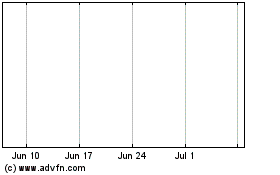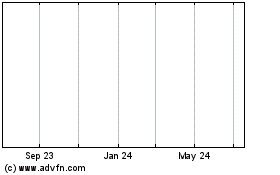FOCUS: Kraft Bank Ties Pose Problem For Other Cadbury Suitors
November 24 2009 - 7:54AM
Dow Jones News
As rivals weigh whether to top Kraft Food Inc's (KFT) GBP9.9
billion ($16.5 billion) offer for Cadbury PLC (CBY) they're
confronting an unusual hurdle: Kraft has extracted exclusivity
agreements from the banks it's using to finance its bid, leaving
contenders with few other banks to choose from.
Kraft, which made a hostile offer for Cadbury on Nov. 9, is
being advised by Lazards (LAZ) and has secured a GBP5.5 billion
bridge loan from a group of nine banks lead by Citigroup Inc. (C),
Deutsche Bank AG (DB) and HSBC Holdings PLC (HBC) and including BNP
Paribas SA (BNP.FR), Barclays Capital, Royal Bank of Scotland Group
PLC (RBS) and Credit Suisse (CS), Societe Generale SA (SCGLY) and
Banco Bilbao Vizcaya Argentaria SA (BBV). The lead banks have cast
the net even further and the number of banks financing Kraft's bid
could grow to 18, a person familiar with the matter told Dow Jones
Newswires earlier this month.
The banks providing the multibillion pound bridge loan have
signed exclusivity agreements which prevent them from jumping ship
to finance any rival bidders, according to several people familiar
with the situation.
"Kraft is being very strategic and tactical - but it needs to be
given the amount of paper and cash that it needs for its bid,"
commented Shore Capital's Clive Black.
Kraft's preemptive measure has shrunk the pool of banks
available to finance counter offers, though it's not clear whether
Kraft has hobbled its rivals enough to discourage them from
bidding.
U.S.-based Hershey Co (HSY) and its controlling charitable trust
are working with adviser JPMorgan Chase (JPM) and Bank of America's
(BAC) Merrill Lynch to raise money, people familiar with the
situation have said. Italian bank Mediobanca (MB.MI) and
London-based Rothschild are advising family-owned Ferrero of Italy,
they added.
Swiss food giant Nestle SA (NSRGY) has yet to declare an
interest but is thought to be considering its options and position
as the industry's landscape looks set to change.
A bank working with a major customer, whether as adviser or
financier or both, is unlikely to risk its reputation by providing
financing or advice to an alternative bidder.
Still, exclusivity agreements for financing banks-- except those
leading the debt package--are rare in M&A transactions,
according to Brett Barragate, partner and co-head of the financial
institutions group at law firm Jones Day in New York.Barragate
said.
"It's bad for (banks') business. They don't want to be tied up
and shut out of other potential bids because they are working with
one party. Only a borrower with significant leverage would be able
to get banks to do this," Barragate said.
"Kraft likely wants to make sure it has the full and undivided
attention of its advisers and it doesn't want the banks to be
restrained in their capacity to lend to it," he added.
Even if Kraft hadn't limited the number of banks available to
other potential bidders, and possibly the ability to raise the
necessary financing, analysts say that rivals would find it a
stretch to make a deal work considering the amount of leverage
required, despite the currently hot state of bond markets.
Cadbury is 1.5 times larger than Hershey in terms of both sales
and operating profits, so it would be difficult for the U.S.
confectioner to go it alone, for one, says Charles Stanley analyst,
Jeremy Batstone-Carr.
And while Ferrero is a similar size to Cadbury, and debt-free,
having to raise the GBP10.3 billion reportedly required to match
Kraft and keeping enough money back to see-off a possible higher
bid from Kraft would be a stretch, he adds.
"It would probably require all three companies to gear up to
some 5 times net debt to EBITDA, a huge ask...which would result in
debt levels that would depend on how Cadbury assets might be
dissected and on what geographical basis, in order that high
gearing might be reduced as swiftly as possible," Batstone-Carr
said.
Others say that Nestle has nothing to gain from launching a bid
because the number and cost of the hurdles that it would face--in
particular antitrust issues--could outweigh potential benefits.
"Nestle has no intention of exiting the confectionery market and
has more than enough firepower to buy whatever it wants but would
have to deal with antitrust regulators in practically all its
markets and especially the U.K. where together with Cadbury it
accounts for half the market," said industry consultant James
Amoroso.
In Canada, Nestle is number one and Cadbury number 3 with
Hershey in the middle. Even in the U.S., where Nestle is a distant
third with just 9% of the market to Hershey's 44% and Mars' 26%,
the critical mass that it would get in terms of sales from
Cadbury's gum business don't justify a massive outlay for a
disciplined company, he said.
If Nestle did merge with Cadbury, the Swiss group would have to
sell a lot, which could give rivals a competitive advantage later,
he said.
-By Kate Haywood and Marietta Cauchi, Dow Jones Newswires; +44
207 842 9241; marietta.cauchi@dowjones.com
Banco Bilbao Arg (NYSE:BBV)
Historical Stock Chart
From Mar 2024 to Apr 2024

Banco Bilbao Arg (NYSE:BBV)
Historical Stock Chart
From Apr 2023 to Apr 2024
